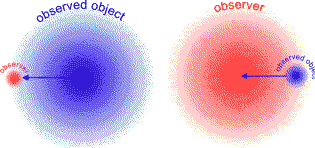..Heidegger (Being and Time)whose human living essence (or Dasein) was something akin to a traveling energy node on a network of inter-relationships..
This is pretty insightful perspective, because Aether foam of AWT works in the exactly the same way, like causal foam. Inside of foam transversal waves of energy spread
along many directions at the same moment, which leads into merging of inner and outer observational perspective and quantum uncertainty again:

When we place a light source inside of bucket into foam, we can observe, the light will penetrate whole volume, so that the inner surface of bucket will remain illuminated by the same way, like this outer one - the light spreading will become omnipresent here and we could see our bucket from both sides in simmilar way, like observable Universe. We can see, how intuitive philosophy converges to rational physics again.
The main trick here is, the foamy behavior of mixed gas-fluid system enables energy to propagate through it with combination of highest speed and energy density, which enables us to see Universe as huge, as possible - so we aren't required to speculate, why observable space-time has such special well tuned foamy structure by some anthropic principle..




